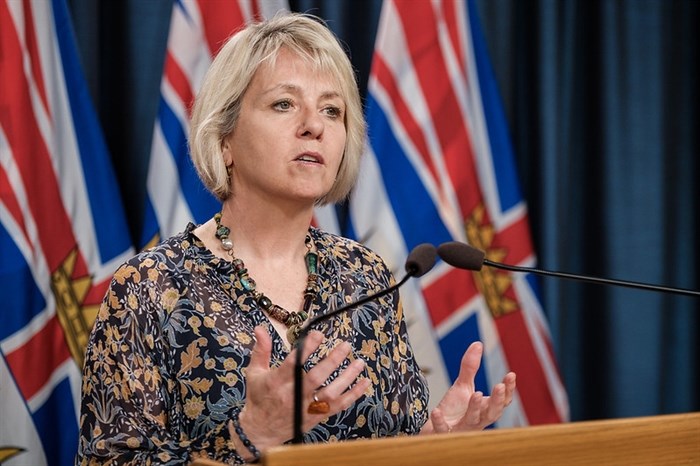
FILE PHOTO - B.C. provincial health officer Dr. Bonnie Henry speaks to reporters during a COVID-19 update, Aug. 24, 2020.
Image Credit: SUBMITTED / Province of B.C.
October 19, 2020 - 3:52 PM
The second wave of COVID-19 has hit B.C., the province’s top doctor confirmed today.
“We are in our second wave of our COVID-19 storm in B.C., but we have control of what that wave looks like. We have shown that we can do that,” provincial health officer Dr. Bonnie Henry said.
Dr. Henry announced record numbers of new cases today, Oct. 19. From Friday to Saturday there were 172 cases, from Saturday to Sunday there were 150 new cases, and from Sunday to today, Oct. 19, there were an additional 174 cases amounting to 499 since the last provincial announcement.
That brings the total number of people diagnosed with COVID-19 in B.C. to 11,687. Of those, 611 are in the Interior Health region, which is an increase of 21 since Friday.
“There continues to be COVID-19 transmission in many parts of our province and we know that... this is expected,” she said. “This virus has not gone away, and it has shown us that it is now quite able to hide and spread in our communities around the province.”
Encouragingly, she said, we in B.C. are not seeing exponential growth. “We do have more people in hospital than we did a few weeks ago, but that has also stabilized,” she said.
“What we are seeing is continued ongoing growth.”
There are hotspots in B.C.’s most densely populated areas in the Lower Mainland and Dr. Henry said the province needs to make sure that everyone does what they can to avoid a steep and sudden increase in new cases, as has been the case in other areas of Canada and in neighbouring countries.
Dr. Henry said B.C. is seeing mostly small transmission chains, within a family or a small group because larger groups have not been allowed to form.
More widespread transmission events have been in workplaces where people are in close contact and there may be breaches in the protective barriers that are in place.
“We were seeing quite a lot more large spreader events when we had nightclubs open (and) when there were large parties through the summer,” she said. “Mostly those have settled down or become much smaller and more easy for us to contain.”
When contact tracers are sent into action, they’re able to isolate people before they develop symptoms and before they spread on to that next group of people.
“That's how we have been pretty successful about breaking the chains in our community,” she said. “And we need to keep up with that because it's when you start getting a lot of spread in the community that you can't keep up with the contact tracing.”
That’s when, Dr. Henry said, “more blunt instruments” are used to prevent spread, like closing businesses and schools.
Since the start of the pandemic, there have been 4,146 people in the Vancouver Coastal Health Authority, 6,244 in the Fraser Health region, 243 people in the Vancouver Island Health region, and 355 people in the Northern Health region, and 88 people who generally reside outside of Canada.
To contact a reporter for this story, email Kathy Michaels or call 250-718-0428 or email the editor. You can also submit photos, videos or news tips to the newsroom and be entered to win a monthly prize draw.
We welcome your comments and opinions on our stories but play nice. We won't censor or delete comments unless they contain off-topic statements or links, unnecessary vulgarity, false facts, spam or obviously fake profiles. If you have any concerns about what you see in comments, email the editor in the link above.
News from © iNFOnews, 2020